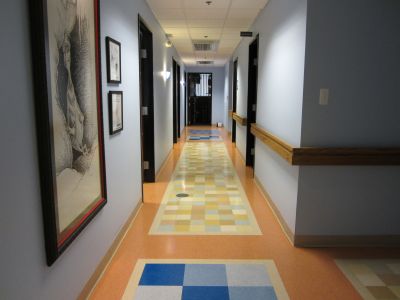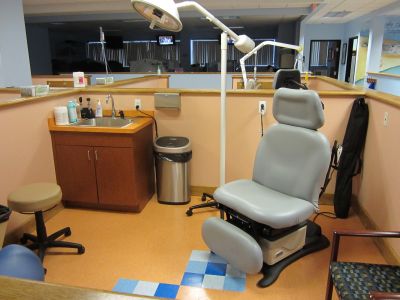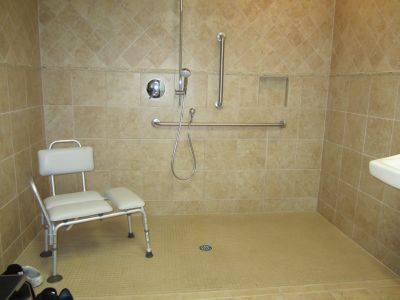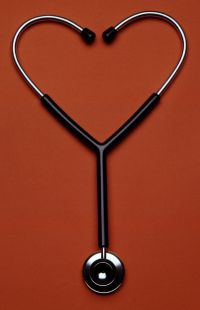Providing Barrier-Free Treatment for Disabled Patients
June 20, 2014
By Rob Striks, Special Writer
Encompass HealthCare and Wound Medicine
One of the most heartbreaking scenes in Forrest Gump is when Lieutenant Dan is coming to grips with the loss of his legs. Robbed of his perceived destiny of dying proudly in battle like his ancestors, and with the weight of his world collapsing down on him, an exhausted Lt. Dan Taylor sighs, "What am I going to do now?"
For Lieutenant Dan and many newly disabled patients, the loss of mobility, independence and dignity can often be more paralyzing than the loss of sensation in their appendages. Just making it through a routine doctor’s office visit can be a most daunting and challenging experience.
For example, most intra-office hallways are designed to allow two people to pass each other comfortably. But what if one of the people is in a wheelchair? What if both are in wheelchairs? It gets uncomfortable very quickly.
"Hop up on the table" is not a problem for most patients. But for paraplegics and quadriplegics, the dynamics are not so easily orchestrated. That's an example of an obvious physical barrier to treatment along with push/pull doors and bathrooms that are not equipped with reinforced safety bars and handles.
Designing a Facility for Patient Accessibility
Wouldn't it be wonderful for these patients to have an outpatient medical facility designed from the ground up to accommodate wheelchair or gurney patients as fully as their free-walking counterparts? Certainly, such a facility would be much more comfortable for the disabled patient and provide him/her with a greater sense of independence and dignity.
That was the thinking behind the creation of Encompass HealthCare and Wound Medicine; an outpatient wound care facility in West Bloomfield, Michigan. Founder and Medical Director, Dr. Bruce Ruben, explains his model.
"Freedom is what I was really striving for with Encompass HealthCare," Ruben said. "I didn't want there to be any barriers for patients to endure in order to obtain treatment. Quadriplegic and paraplegic patients have enough medical challenges in their lives. Access to the care in the first place shouldn't be one of them," he said.

Automatic Doors and 48-inch Tall Windows
Among the many amenities that are included in the Encompass HealthCare design are automated doors at both inside and outside entrances to the office. Extending from the outside entrance is a stretched awning so patients don't have to wait in the rain, wind or snow while the automatic doors open. True, these may seem like minor conveniences to most patients, but to someone in a wheelchair or on a gurney, they mean less vulnerability, which translates into better healthcare experiences.
One unique feature built into Encompass HealthCare is 48-inch tall walls in the front treatment cubicles of the office. They lengthen the lines of sight for wheelchair patients. According to Dr. Ruben, there is an important psychology behind the design.

"Shorter walls are simply less intimidating for the disabled patient than being surrounded by four, full-size walls. Forty-eight inch walls give the outer office an open and airy feeling. Wheelchair-bound patients feel more in control since they can see more of what’s going on around them," Ruben said. "They also provide a sense of community, particularly when we're busy."
Removing Patient Barriers to the Health Care Facility
Encompass HealthCare is located on the ground floor inside the Lakes Medical Center and excellent handicapped parking is available right outside the office entrance. For patients who require extra assistance, wheelchairs and walkers are available just inside office's front door. The staff is trained and ready to help get patients from their vehicles to their treatment areas close by.
Once inside, the staff is able to utilize a convenient lift system to transfer patients from their chairs or gurneys onto their treatment tables. The facility is also equipped with a full, roll-in shower and all the bathrooms are equipped with reinforced safety bars and handles.

"We have patients with urinary catheters and colostomies. Sometimes, those systems can fail and for the patient, it can be very embarrassing. But we're all very caring and professional about it when those things happen and we're well equipped to clean them up quickly. We always have fresh towels and scrubs to give them should the need arise," Dr. Ruben explained.
Eliminating the barriers to the comfortable and dignified delivery of health care goes beyond providing the amenities and physical properties patients need. More important may be the psychological barriers imposed. For those, Dr. Ruben has only two suggestions that have obviously worked in his practice.
"You have to hire the right personalities to work together and the training is every day," Ruben said. "If I had to put it in just two words, they would be 'passion' and 'compassion.'
"To do what we do every day, seven days a week, passion and compassion have to be deep in your DNA. When a patient experiences that in you, all the psychological barriers come down. They know you care, that you're on their side and that they're not alone in their goal to heal their wound or to overcome an underlying condition preventing that wound from healing," said Dr. Ruben.
"I think we, as providers, will always be the most powerful barrier-busting force for paraplegic and quadriplegic patients. The equipment and the layout are necessary tools. But it's the relationships we have with our patients that, from my perspective, eliminates a great deal of the barriers for disabled patients and for healing in general."

About the Author
Dr. Bruce Ruben is the Founder and Medical Director of Encompass HealthCare, located in West Bloomfield, Michigan. Encompass Healthcare is an outpatient facility featuring advanced wound care, IV antibiotic therapies, hyperbaric oxygen treatment, nutritional assessment, and other treatment modalities. Dr. Ruben is board certified in Internal Medicine, Infectious Disease, and in Undersea and Hyperbaric Medicine. He is a member of the Medical and Scientific Advisory Committee and National Spinal Cord Injury Association (NSCIA) board.
The views and opinions expressed in this blog are solely those of the author, and do not represent the views of WoundSource, Kestrel Health Information, Inc., its affiliates, or subsidiary companies.
The views and opinions expressed in this blog are solely those of the author, and do not represent the views of WoundSource, HMP Global, its affiliates, or subsidiary companies.







